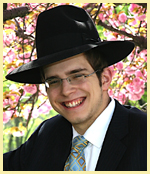Parshas Vayigash 5782
Thanks for the pain!
[Editor’s note: As a memory of my beloved brother Shaya, I would like to continue sending out his pearls of wisdom that he has shared with all of you in the past. For some of you this may ring a bell and for others it may appear to be totally new. May the learning of Shaya’s Divrei Torah inspire us to change our ways and thereby give an Aliya to the neshama of our dear beloved Shaya whom we miss so much. A special thank you to Aaron Friedman for always looking over the divrei torah.]
In Parshas Vayigash, the Torah tells us that when Yosef couldn’t keep up his facade, he ordered “everyone” to leave the room, so he could be left alone with his brothers. The Pasuk continues to say that “there was no EESH [man] present when Yosef revealed himself to his brothers.” If Yosef, the viceroy of Mitzrayim, commanded everyone to leave the room, it goes without saying that everyone would leave the room. The Pasuk doesn’t need to tell us that EVERYONE left. Who, then, is the Pasuk referring to when it says there was no ‘Eesh’ in the room?
Rav Shmuel Brazil suggests a novel answer with an important message: When bad things happen, it is common for people to blame the bad event on someone or something. “Had we only gotten a better doctor, grandpa wouldn’t have died” or “Had we only been driving on a different street/lane, he wouldn’t have been hit by the car.” Such an attitude displays a lack of faith in Hashem. Yes, we are supposed to do our hishtadlus to be as careful as we can, but ultimately, when bad things happen to us, R”L, we must realize it is from Hashem. That is what the Torah is teaching us about Yosef.
What caused Yosef to be sold and descend to Mitzrayim? His father sent him to Shechem to visit his brothers. He arrived in Shechem and his brothers were nowhere to be found. He met an ‘EESH’ [the angel Gavriel] who told him where his brothers were…. Had Yosef not met that “EESH,” Yosef wouldn’t have known where his brothers were, he could have returned to his father, and then seemingly everything would have been fine and dandy. Hence now, when Yosef is revealing himself to his brothers and explaining his story, he could have easily partly blamed that ‘EESH’ and/or them for the immense suffering he went through.
That, suggests Rav Brazil, is what the Pasuk is referring to when it says ‘There was no EESH there when Yosef revealed himself to his brothers’. I.e. Yosef DIDN’T mention the EESH at all and didn’t blame him [or anyone else] at all for any of his suffering. He recognized that it was all part of Hashem’s master plan for him to come down to Mitzrayim!
This is the very meaning of what we say every day at the end of davening “ani maamin b’emunah shileimah that Hashem is boreh umanhig.- I believe with complete faith that Hashem is the one who creates and runs the world.” We are acknowledging that whatever happened the day before and whatever will happen today is all part of Hashem’s plan.
May we all take this lesson to heart to never blame other factors for our suffering and pain. Rather, let us recognize that it is all part of Hashem’s master plan for us to fulfill our mission in life and grow closer to Him.
{Editor’s note: I heard from my friend Aaron Friedman a similar idea from Rav Elimelech Biderman. Rav Biderman quotes the Sfas Emes, who says that when Yosef said to his brothers “Ani Yosef Achichem ASHER MICHARTEM osi mitzraymah- I am Yosef your brother whom you sold to Mitzraim,” the word ASHER can also mean “thanks.” Yosef was thanking his brothers and saying that the reason I am a tzadik despite being in Mitzrayim is thanks to your selling me.
In other words, I would explain the Sfas Emes that Yosef ws telling his brothers, “Thank you for the pain! It was all for my benefit! I am who I am because of the fact that you sold me to Mitzrayim! It was exactly what Hashem wanted to happen and it was the very best for me! Therefore I say Thank you!”
To have the ability to see beyond the circumstances, and realize that there is a master puppeteer running the show, and to have no feelings of anger at the brothers; takes a lot of strength.
May we all strive to reach that level of connection to Hashem where we can look at all the things that happen to us and say THANK YOU HASHEM! EVERYTHING YOU DO FOR US IS THE BEST!
Have a wonderful Shabbos!} |





